Politics
Muhammad Abu Dakha’s daring escape story
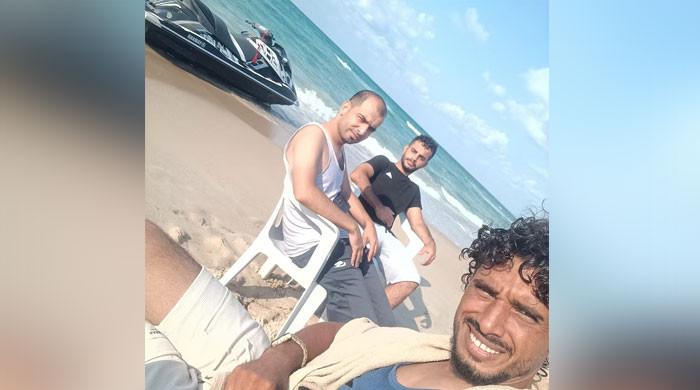

It took more than a year, several thousand dollars, ingenuity, setbacks and a jet ski: this is how Muhammad Abu Dakha, a 31-year-old Palestinian, managed to escape from Gaza to reach Europe.
He documented his story through videos, photographs and audio files, which he shared with Reuters. Reuters also interviewed him and his travel companions upon their arrival in Italy, and his relatives in the Gaza Strip.
Fleeing the devastation caused by the nearly two-year-old Israel-led war, in which Gaza health authorities say nearly 65,000 Palestinians have been killed, Abu Dakha crossed the Rafah border point into Egypt in April 2024, paying $5,000.
To China and back
He said he initially went to China, where he hoped to win asylum, but returned to Egypt, via Malaysia and Indonesia, after that failed. He showed Reuters email correspondence with the UN Refugee Agency (UNHCR) Representation in China from August and September 2024.
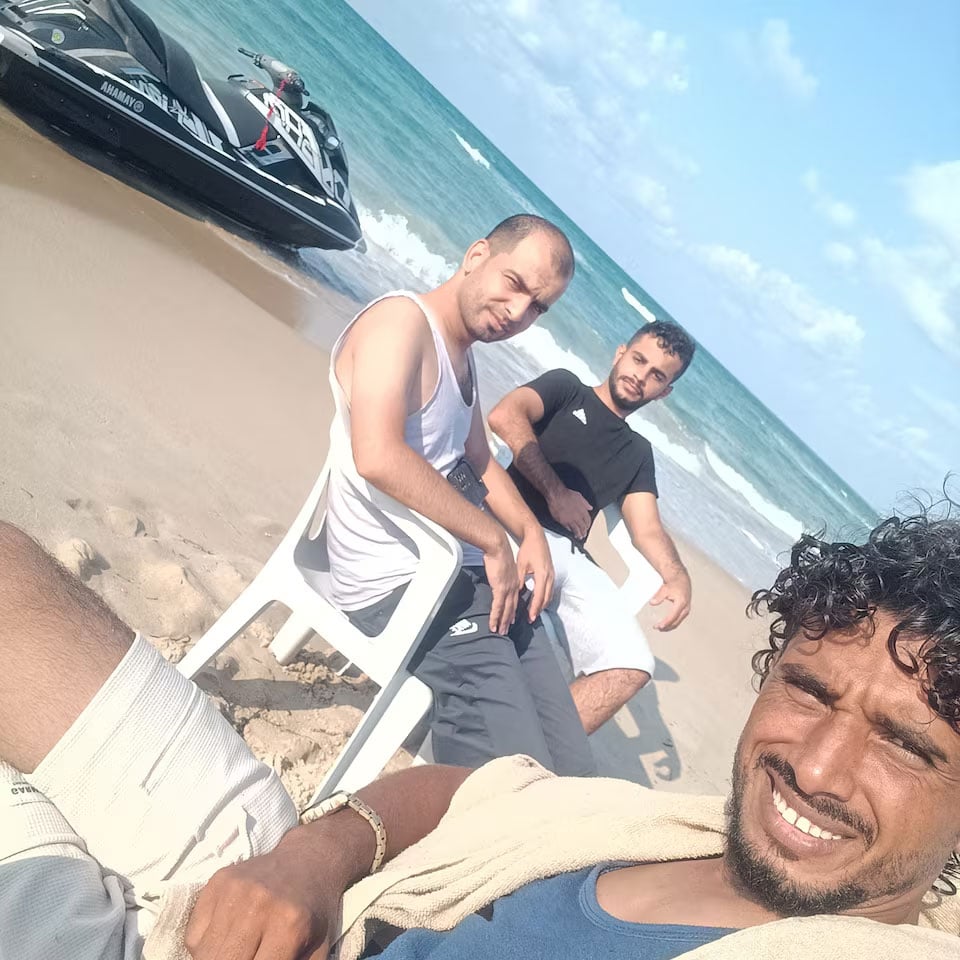
Abu Dakha then went to Libya where, according to multiple reports by human rights groups and the UN, tens of thousands of migrants are routinely abused and exploited by traffickers and militias while trying to secure a spot on a boat to Europe.
According to data from Italy’s interior ministry, more than 47,000 boat migrants have arrived in the country in the year to date, mostly from Libya and Tunisia. But Abu Dakha made it across in highly unusual circumstances.
After 10 failed crossing attempts with smugglers, he said he purchased a used Yamaha jet ski for about $5,000 through a Libyan online marketplace and invested another $1,500 in equipment, including a GPS, a satellite phone and life jackets.
Accompanied by two other Palestinians, 27-year-old Diaa and 23-year-old Bassem, he said he drove the jet ski for about 12 hours, seeing off a chasing Tunisian patrol boat, all while towing a dinghy with extra supplies.
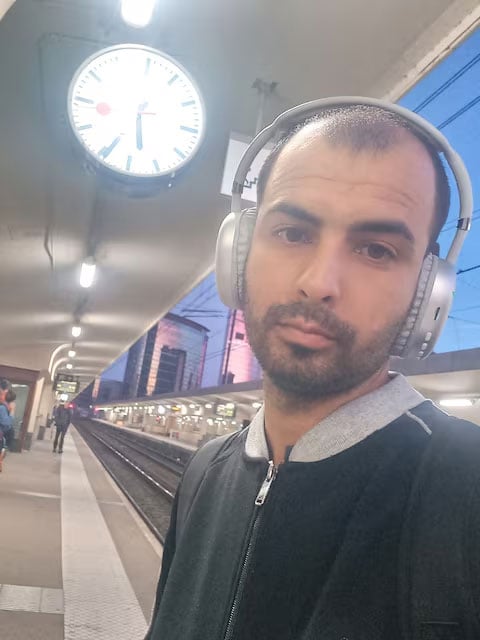
The trio used ChatGPT to calculate how much fuel they would need, but still ran out some 20 km (12 miles) shy of Lampedusa. They managed to call for help, prompting a rescue and their landing on Italy’s southernmost island on August 18.
They were picked up by a Romanian patrol boat taking part in a Frontex mission, a spokesperson for the European Union’s border agency said, describing the circumstances as “an unusual occurrence.”
“It was a very difficult journey, but we were adventurers. We had strong hope that we would arrive, and God gave us strength,” said Bassem, who did not share his surname.
“The way they came was pretty unique,” said Filippo Ungaro, spokesperson for UNHCR Italy, confirming that authorities recorded their arrival in Italy after a jet ski journey from the Libyan port of al-Khoms and a rescue off Lampedusa.
In a straight line, al-Khoms is about 350 km from Lampedusa.
Abu Dakha contacted Reuters while staying in Lampedusa’s migrant centre, after being told by a member of the staff there that his arrival via jet ski had been reported by local media.
From that point he shared material and documents, although Reuters was unable to confirm certain aspects of his account.
From Lampedusa to Germany
From Lampedusa, the odyssey continued. The three men were taken by ferry to mainland Sicily, then transferred to Genoa in northwestern Italy, but escaped from the bus transporting them before getting to their destination.
A spokesperson for the Italian interior ministry said it had no specific information about the trio’s movements.
After hiding in bushes for a few hours, Abu Dakha took a plane from Genoa to Brussels. He shared with Reuters a boarding card in his name for a low-cost flight from Genoa to Brussels Charleroi, dated August 23.
From Brussels, he said he travelled to Germany, first taking a train to Cologne, then to Osnabrueck in Lower Saxony, where a relative picked him up by car and took him to Bramsche, a nearby town.
He says he has applied for asylum, and is waiting for a court to examine his application, with no date set yet for a hearing. He has no job or income and is staying in a local centre for asylum seekers.
Germany’s Federal Office for Migration and Refugees declined to comment on his case, citing privacy reasons.
Abu Dakha’s family remains in a tent camp in Khan Younis in southern Gaza, their home destroyed.
“He had an internet shop, and his work, thank God, was comfortable financially and everything. He had built things up, and it all collapsed,” said his father, Abdrabuh Souliman Abu Dakha, speaking from Gaza.
Abu Dakha hopes to win the right to stay in Germany, and bring over his wife and two children, aged four and six. He said one of them suffers from a neurological condition requiring medical care.
“That’s why I risked my life on a jet ski,” he said. “Without my family, life has no meaning.”
Politics
Trump invites more leaders to join Gaza ‘Board of Peace’
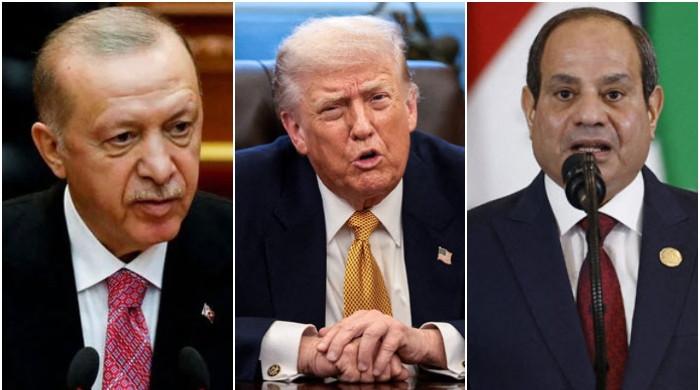
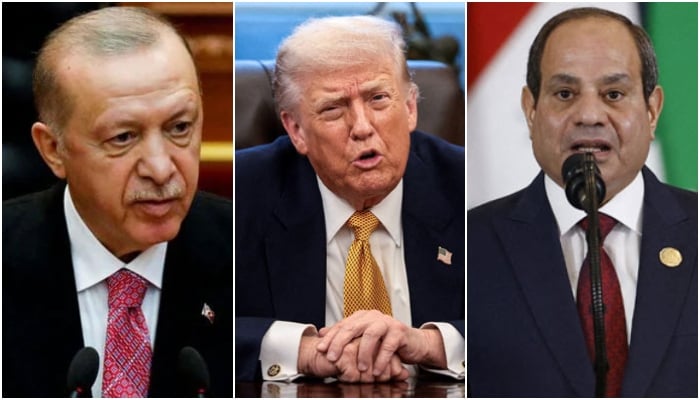
- Cairo “studying” request for Sisi to join board, says FM.
- Canadian PM intends to accept Trump’s invitation: aide.
- Argentine president says it will be an ‘honour’ to join initiative.
WASHINGTON: US President Donald Trump’s so-called “Board of Peace” for postwar Gaza began to take shape Saturday, with the leaders of Egypt, Turkey, Argentina and Canada asked to join.
The announcements from those leaders came after the US president named his Secretary of State Marco Rubio, former British prime minister Tony Blair, and senior negotiators Jared Kushner and Steve Witkoff to the panel.
Trump had already declared himself the chair of the body, as he promotes a controversial vision of economic development in the Palestinian territory, which lies in rubble after two-plus years of relentless Israeli bombardment.
The moves came after a Palestinian committee of technocrats meant to govern Gaza held its first meeting in Cairo which was attended by Kushner, Trump’s son-in-law who has partnered with Witkoff for months on the issue.
In Canada, a senior aide to Prime Minister Mark Carney said he intended to accept Trump’s invitation, while in Turkey, a spokesman for President Recep Tayyip Erdogan said he had been asked to become a “founding member” of the board.
Egypt’s Foreign Minister Badr Abdelatty said Cairo was “studying” a request for President Abdel Fattah al-Sisi to join.
Sharing an image of the invitation letter, Argentine President Javier Milei wrote on X that it would be “an honour” to participate in the initiative.
In a statement sent to AFP, Blair said: “I thank President Trump for his leadership in establishing the Board of Peace and am honoured to be appointed to its Executive Board.”
Blair is a controversial figure in the Middle East because of his role in the 2003 invasion of Iraq. Trump himself said last year that he wanted to make sure Blair was an “acceptable choice to everybody.”
Blair spent years focused on the Israeli-Palestinian issue as representative of the “Middle East Quartet” – the United Nations, European Union, United States and Russia – after leaving Downing Street in 2007.
The White House said the Board of Peace will take on issues such as “governance capacity-building, regional relations, reconstruction, investment attraction, large-scale funding and capital mobilisation.”
The other members of the board so far are World Bank President Ajay Banga, an Indian-born American businessman; billionaire US financier Marc Rowan; and Robert Gabriel, a loyal Trump aide who serves on the US National Security Council.
Trump has created a second “Gaza executive board” that appears designed to have a more advisory role.
It was not immediately clear which world leaders were asked to be on each board.
The White House, which said Friday that additional members would be named to both entities, did not immediately reply to a request for comment.
Israel strikes
Washington has said the Gaza plan had gone on to a second phase – from implementing the ceasefire to disarming Hamas, whose October 2023 attack on Israel prompted the massive Israeli offensive.
On Friday, Trump named US Major General Jasper Jeffers to head the International Stabilization Force, which will be tasked with providing security in Gaza and training a new police force to succeed Hamas.
Jeffers, from special operations in US Central Command, in late 2024 was put in charge of monitoring a ceasefire between Lebanon and Israel, which has continued periodic strikes aimed at Hezbollah.
Gaza native and former Palestinian Authority deputy minister Ali Shaath was earlier tapped to head the governing committee.
Trump, a real estate developer, has previously mused about turning devastated Gaza into a Riviera-style area of resorts, although he has backed away from calls to forcibly displace the population.
Politics
India slaps $2.45m fine on IndiGo for mass flight cancellations
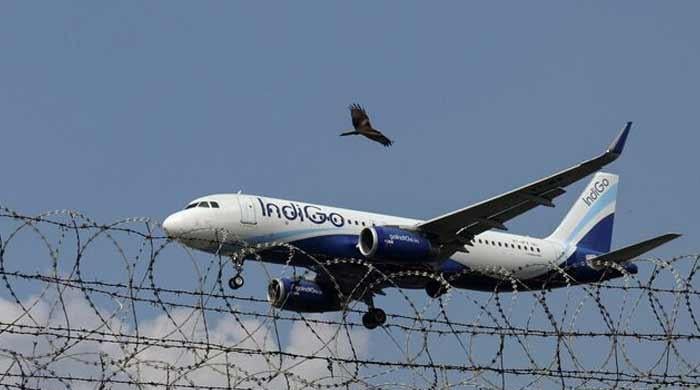
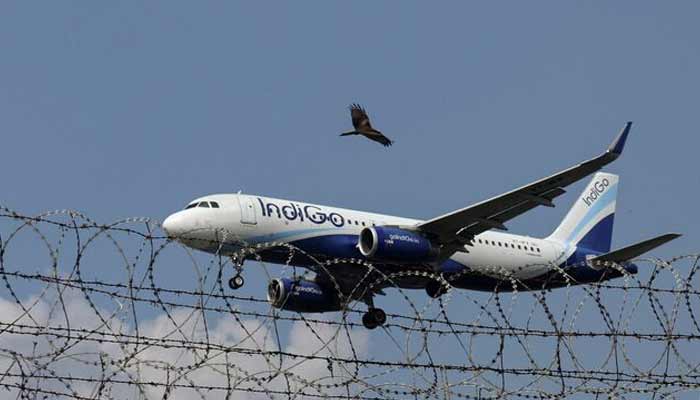
- Private carrier admits misjudgement, planning gaps.
- Regulator orders IndiGo to relieve senior office bearers.
- Operational meltdown linked to new policy of pilot rest.
India’s civil aviation regulator on Saturday imposed a fine of $2.45 million on IndiGo, the country’s biggest airline, for poor roster planning that led to large-scale flight cancellations in December.
Airports across India were thrown into disarray late last year, with the private carrier admitting “misjudgement and planning gaps” in adapting to a new policy of pilot rest.
Over 4,000 mostly domestic flights were either cancelled or delayed for over a week across the country, stranding hundreds of thousands of passengers.
The operational meltdown came even though IndiGo had two years to prepare for the new rules aimed at giving pilots more rest periods in between flights to enhance passenger safety.
The Directorate General of Civil Aviation (DGCA) said it was levying the penalty for several lapses, including “failure to strike (a) balance between commercial imperatives and crew members’ ability to work effectively”.
The regulator ordered IndiGo to relieve its senior vice president of its operations control centre of his responsibilities, according to a statement released on Saturday.
It also issued warnings to senior officials at the company, including CEO Pieter Elbers “for inadequate overall oversight of flight operations and crisis management”.
There was no immediate response from IndiGo to the fine.
IndiGo, which commands 60% of India’s domestic market, operates more than 2,000 flights a day.
The crisis was one of the biggest challenges faced by the no-frills airline that has built its reputation on punctuality.
India is one of the world’s fastest growing aviation markets. In November 2024, IndiGo reached a daily level of 500,000 passengers for the first time.
Politics
Protesters rally in Denmark and Greenland against Trump annexation threat
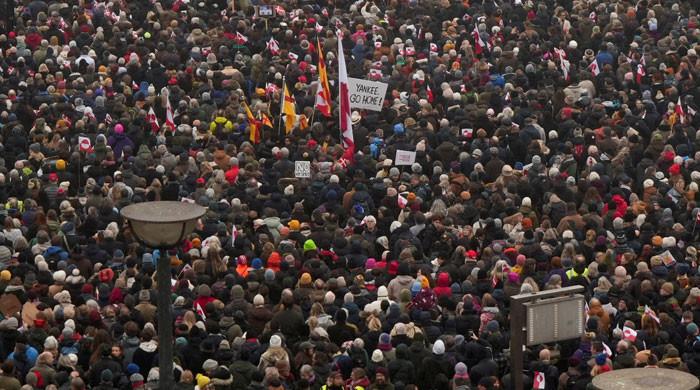
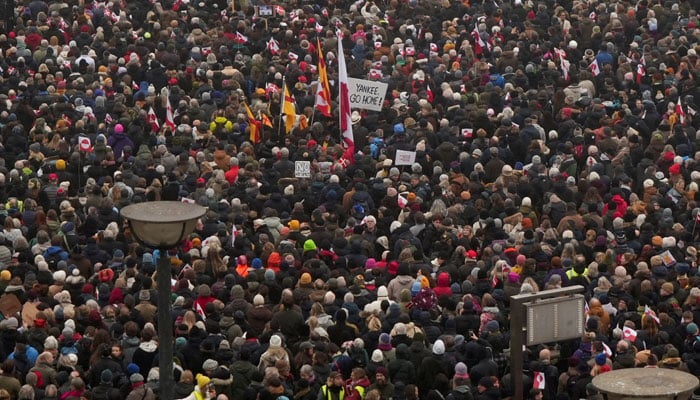
- Protesters chant, “Greenland is not for sale.”
- Over “20,000 people” attend protest in Copenhagen.
- Trump says Greenland vital to US security.
COPENHAGEN: Protesters in Denmark and Greenland demonstrated on Saturday against President Donald Trump’s demand that the Arctic island be ceded to the US and called for it to be left to determine its own future.
Trump says Greenland is vital to US security because of its strategic location and large mineraldeposits, and has not ruled out using force to take it. European nations this week sent military personnel to the island at Denmark’s request.
In Copenhagen, demonstrators chanted “Greenland is not for sale” and held up slogans such as “No means No” and “Hands off Greenland” alongside the territory’s red-and-white flag as they marched to the US embassy.
Some wore red baseball caps resembling the “Make America Great Again” caps of Trump supporters, but with the slogan “Make America Go Away”.

In Greenland’s capital Nuuk, hundreds of protesters led by Prime Minister Jens-Frederik Nielsen carried flags and similar banners as they headed for the US consulate.
They passed a newly built block where Washington plans to move its consulate – currently a red wooden building with four staff.
Organisers estimated over 20,000 people attended the protest in Copenhagen – akin to the entire population of Nuuk – though police did not provide an official figure. Other protests were held across Denmark.
“I am very grateful for the huge support we as Greenlanders receive … we are also sending a message to the world that you all must wake up,” said Julie Rademacher, chair of Uagut, an organisation for Greenlanders in Denmark.
Trump triggers diplomatic rift
Trump’s repeated statements about the island have triggered a diplomatic crisis between the US and Denmark, both founding members of the NATO military alliance, and have been widely condemned in Europe.
The territory of 57,000 people, governed for centuries from Copenhagen, has carved out significant autonomy since 1979 but remains part of Denmark, which controls defence and foreign policy, and funds much of the administration.
Some 17,000 Greenlanders live in Denmark, according to Danish authorities.
All five parties elected to Greenland’s parliament ultimately favour independence, but they disagree on the timing and have recently said they would rather remain part of Denmark than join the US
Only 17% of Americans approve of Trump’s efforts to acquire Greenland, and large majorities of Democrats and Republicans oppose using military force to annex it, a Reuters/Ipsos poll found. Trump called the poll “fake”.
-

 Tech5 days ago
Tech5 days agoNew Proposed Legislation Would Let Self-Driving Cars Operate in New York State
-

 Sports1 week ago
Sports1 week agoClock is ticking for Frank at Spurs, with dwindling evidence he deserves extra time
-
Sports1 week ago
Commanders go young, promote David Blough to be offensive coordinator
-

 Entertainment4 days ago
Entertainment4 days agoX (formerly Twitter) recovers after brief global outage affects thousands
-

 Fashion7 days ago
Fashion7 days agoSouth India cotton yarn gains but market unease over US tariff fears
-

 Fashion7 days ago
Fashion7 days agoChina’s central bank conducts $157-bn outright reverse repo operation
-

 Business1 week ago
Business1 week agoSoftBank reduces Ola Electric stake to 13.5% from 15.6% – The Times of India
-

 Sports7 days ago
Sports7 days agoUS figure skating power couple makes history with record breaking seventh national championship






